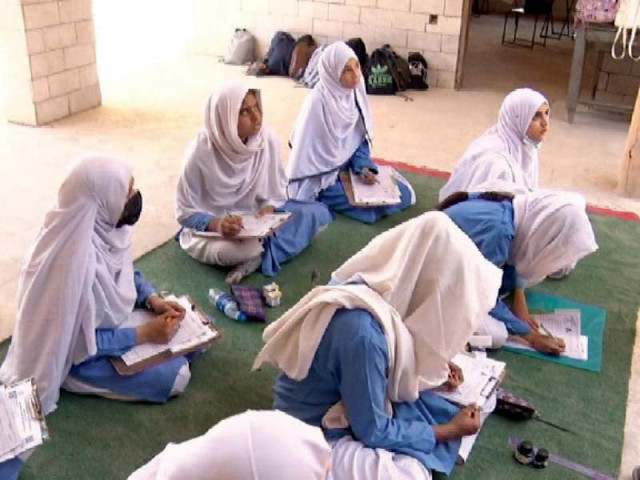Facilities missing, students drop out
Schools with issues like lack of drinking water, restrooms have seen enrollment numbers drop dramatically

At a time when the inflationary crunch is actively pushing children out of schools, issues like lack of infrastructure are not doing Karachi’s educational institutions any favours either.
According to internal documents of the provincial education department made available to The Express Tribune, out of 1914 government schools in Karachi only 749 are properly functional — a staggering 39 per cent.
The documents, which offer a comparative review of the school census conducted by the Department of School Education in 2021-2022 against the 2019 school year, reveal that out of 1,914 government schools 1,657 do not have drinking water, 542 are without electricity, and 380 have no toilets. The damning comparative review documents further show that 1,710 of the total schools have no library, 1,588 schools have no science laboratories, and 1,528 do not have a computer laboratory.
Consequently, as per the report, Karachi’s school enrollment numbers which stood at 459,000 in 2019 have dropped to 395,522 in 2021 and 2022 - a 13 per cent drop in enrollment in the economic hub of a country, which already happens to be marred with high dropout rates. Moreover, it is pertinent to mention that given the present double-digit inflation and the poor economic forecast for the next year, the enrollment numbers are expected to drop even further.
In this regard, a teacher from the renowned Allama Iqbal School in Sohrab Goth, told The Express Tribune under the condition of anonymity, that there was no doubt in his mind that poor infrastructure was leading to children dropping out of schools. “Damaged furniture, broken windows, and absent teachers and support staff, have become the hallmarks of Karachi’s government schools. Who would want to study in such an environment?”
Dr Muhammad Memon, an educationist and former chairman of the Hyderabad Education Board, agrees. “There is barely any use of the monitoring mechanism employed in Sindh’s schools. Our decisions and policies vis a vis education are ill-informed and all over the place,” criticised Dr Memon. The educationist was of the view that the monitoring mechanisms should be used to make decisions backed by data which would help increase enrollment rates.
The Express Tribune also contacted the Secretary Department of School Education, Ghulam Akbar Laghari, to confirm the veracity of the internal documents, who conceded that the census results were true. “As much as 85 per cent of the department’s budget is going towards salaries of teaching and non-teaching staff. It is difficult to provide facilities with the remainder,” said Laghari, adding that they are trying to do their best. The Secretary further explained that whenever they receive reports of missing facilities, they try to address the problems on a first come first serve basis to ensure that funds are distributed equally amongst all schools. “We are aware of the problems but there is not much we can do with the current budget,” remarked Laghari, while talking to The Express Tribune.
Published in The Express Tribune, May 12th, 2023.



















COMMENTS
Comments are moderated and generally will be posted if they are on-topic and not abusive.
For more information, please see our Comments FAQ